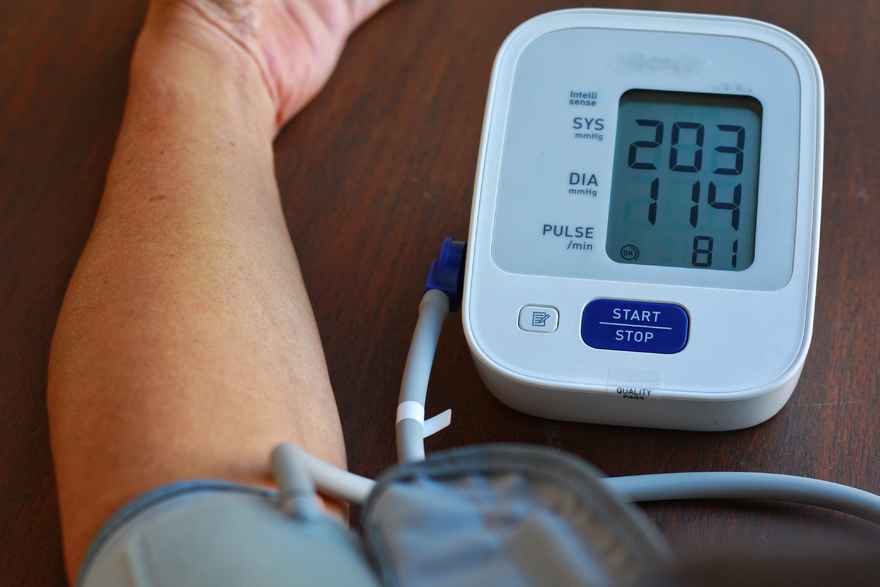Does Sugar Cause High Blood Pressure?

High Blood Pressure is called the silent killer because many people with high blood pressure are not aware of it. It is estimated that one in three Americans (over 100 million people) suffer from high blood pressure. It is the number one risk factor for heart disease which is the number one killer of men and women living in industrialized countries.
While high blood pressure is often defined as above 130 over 90, studies have shown that the healthiest blood pressure is 110 over 70. Levels that run too low are also associated with premature death. In other words, there is a sweet spot.
For a vast majority of people, it is high blood pressure they need to be concerned about.
Dietary recommendations to reduce high blood pressure run the gamut but they consistently recommend reducing, if not eliminating, all processed foods, especially sugar and sweetened beverages. The DASH Diet, promoted by the US National Institute of Health (NIH), also limits salt and fat.
While the idea that salt causes high blood pressure has come under fire, most notably in the book The Salt Fix, the book’s author Dr. James DiNicolantonio acknowledges that salt can be a significant driver of high blood pressure in salt sensitive adults, which by some estimates are about 25% of the population.
If you are salt-sensitive, sugar consumption (via insulin resistance) can “enhance the blood pressure response to sodium intake.” In short, cut sugar and the negative impact of salt consumption may be mitigated.
Dr. James DiNicolantonio’s article in the medical journal OpenHeart, argues sugar is the white crystal we should be focused on:
“While there is no argument that recommendations to reduce consumption of processed foods are highly advisable, the benefits of such recommendations might have less to do with sodium and more to do with highly-refined carbohydrates. It is time for guideline committees to focus greater attention to the likely more-consequential food additive — sugar.”
In terms of why sugar is implicated in high blood pressure, here is one…
Insulin blocks nitric oxide which the body uses to dilate blood vessels that can lower blood pressure. Sustained high levels of circulating insulin will therefore directly contribute to elevated high blood pressure by blocking the production and effectiveness of nitric oxide.
[Insulin] blocks the ability of the body to make nitric oxide. Nitric oxide is important to blood vessels because it is one of the very few ways to expand the size of the blood vessels and lower blood pressure.
Further, Dr. Richard Johnson's research as detailed in his book Nature Wants Us To Be Fat, shows that sugar consumption, in particular fructose, increases uric acid production which increases blood pressure. In fact, Uric Acid has been linked to high blood pressure since 1874.
Uric acid, with respect to high blood pressure, creates trouble in all kinds of interesting ways. This includes building up inside blood vessels which leads to reduced blood flow. This can trigger the body to increase blood pressure. Uric acids deposits can also damage the blood vessel lining, decrease nitric oxide function, and inflict oxidative stress on capillaries, all of which contributes to the development of heart disease and stroke.
In summary, sugar consumption is directly linked to high blood pressure, which is directly linked to heart disease which is the leading cause of premature death in developed nations.
— Florence
PS - If you are currently on high blood pressure medication and you reduce or eliminate your consumption of sugar, you will need to get your medication adjusted and sometimes quickly. Work closely with your doctor.
SOURCES:
- https://pubmed.ncbi.nlm.nih.gov/29304766/
- https://www.ncbi.nlm.nih.gov/pmc/articles/PMC5764869/
- https://news.virginia.edu/content/uva-researchers-new-diagnostic-test-can-identify-each-person-s-optimal-salt-intake
- https://openheart.bmj.com/content/1/1/e000167
- https://www.endocrineweb.com/conditions/diabetes/can-blood-sugar-affect-blood-pressure
- https://www.drlaurendeville.com/articles/uric-acid-blood-pressure/
Stay Connected.
Be the first to hear about new courses, workshops, podcast interviews,
and free resources created to help you find and sustain food recovery.
Stay Connected.
Be the first to hear about new courses, workshops, podcast interviews,
and free resources created to help you find and sustain food recovery.
Stay Connected.
Be the first to hear about new courses, workshops, podcast interviews, and free resources created to help you find and sustain food recovery.
0 comments
Leave a comment